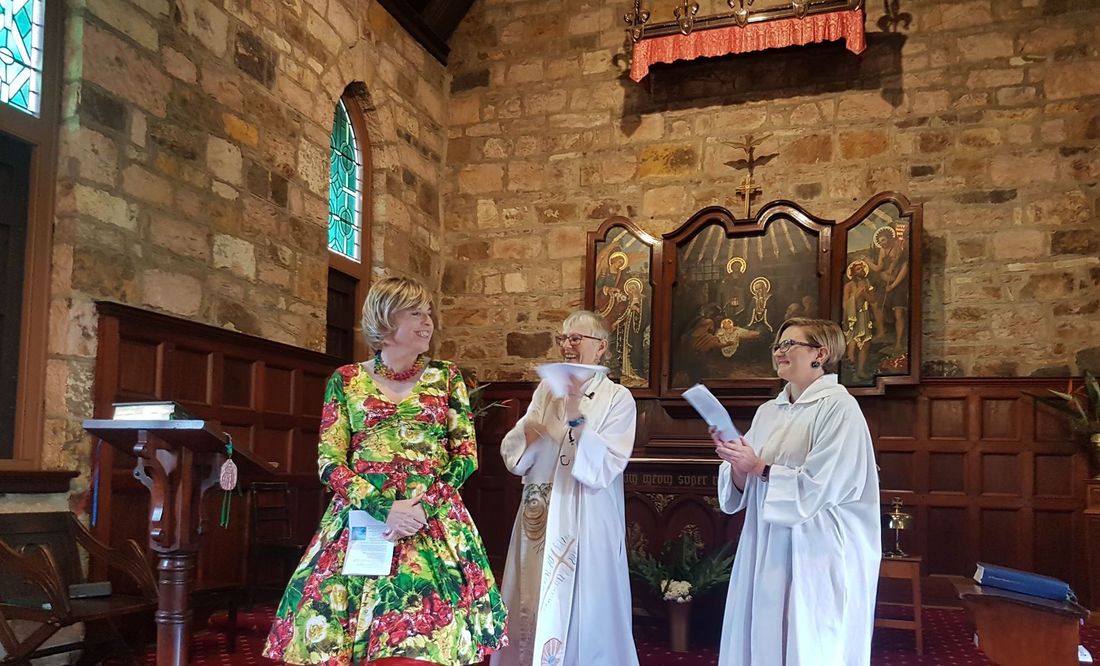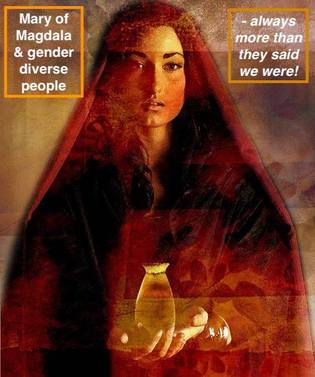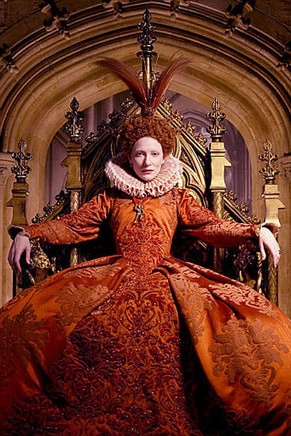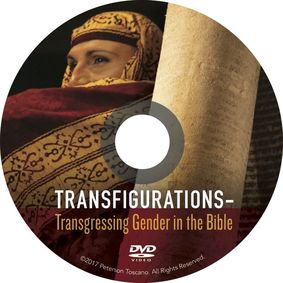 It was with huge delight - among an amazing number of fabulous friends - that I renewed my baptismal vows in my authentic name (Josephine McDonnell) last Sunday, and then shared in a wonderful party to mark the anniversary of my Re-Birth Day. It has taken me a few days to recover - not just because I have been struggling with a bit of ill-health - but because it was such an affirmation, both of my self in all that I am and also of the gorgeous relationships in which I share. It has taken a little adjusting to: for my old 'male assigned' self would have hated the attention and probably beaten myself up a bit in the process, but happiness is so precious and not to spurned, and we need to celebrate what is good when these blessed moments appear. Not to do so is to fail to love ourselves and give thanks for the greater ever (re-)creating love in which we live, breathe, move and have our being/becoming. That is a vital reason why renaming and other affirmation rituals are so important and why it is so disappointing that they are not more actively welcomed and developed with us by religious leaders. How good it is that the Episcopal Church now has such official liturgy (see reflection here from TransEpiscopal) and that others of are at least working on them (see some other examples on my prayer resources pages). For my part, I drew together some of what I feel are beautiful elements of liturgies from across the world - for the full liturgy see here. This included some words of my friend Cathy Laufer which included prayers for my parents and godparents, recognising the integrity in which they gave me a baptismal name from which I have now rightly parted. Best of all however were the readings and actions which brought so many happy tears from across the gathering. Friends' readings of the astonishing promise to the eunuchs in Isaiah 56, of Kathy Galloway's marvelous poem Cross-Border Talks, and, above all, J Mase III's poem Josephine were particularly moving, speaking both of my own journey and of the renewing love we were releasing for all.
0 Comments
 Mary Magdalene and I go back a long way. She was my sister, my model, my soul-partner through the anguish of puberty and adolescence - see further my reflection on our Jesus Christ Superstar dance of delight, shame and longing here. She was my friend, my comforter, my support through the vital stages and all the key changes of my life - helping me cast off 'the Norman yoke' (see here). She remains my strong inspiration in following Jesus, in allowing my demons and fear to be transformed, and in speaking the truth. Mary travels with me to wherever and whatever it is I am now called. For she is the first and supreme witness to Resurrection. Silenced, suppressed, and staggeringly (sexually) stigmatised, over centuries, she survives to speak of the power of female strength, spirituality and compassion. And, though I had not planned it ahead, her feast day (22 July) became the day of my public coming out as transgender. Like Mary, despite my fear, when I heard my name truly spoken, I could not but take faith and believe, receiving and sharing the hope of new life for myself and others. On her feast day this year, with the assistance of some my wonderful friends and colleagues, I am thankful to preach, preside, and be blessed by the Revd Dr Steven Ogden and the loving, affirming community, at Holy Trinity, Fortitude Valley, and then to be able, in the Milton Anglican parish, to renew my baptism vows in my now legal authentic name and to share in a joyful 'Re-Birth Day' party. This is both a celebration of what has been and also a re-commitment to the journey we have shared. As a child, I was given the role of the third 'king' among the Magi in the nativity play. Literally and metaphorically, like Mary of Magdala, I may therefore have once felt that myrrh bearing was my best and only duty. Proclaiming and living new life is so much better.  When I was nine or ten, I wore a terrific fancy dress costume in the form of a Norman soldier. My wonderful creative father created it, using a range of ordinary materials, including papier mache. I wore it for a fancy dress contest in which I entered with my sister. I was proud of it, particularly of how striking it was, and, above all, because of my father's outstanding skills. Yet, for all that, I felt lost, betraying myself, and even entombed in it, As I looked at my sister's costume, another amazing creation of my father, I knew I so much wanted to be wearing that. For hers was a fabulous Elizabeth 1 dress, with impressive mock velvet, a sumptuous skirt and puffed sleeves, and a charming collar, colours, and pleats. I was so captivated, yet strangely not envious of my sister herself, and was hugely delighted when she won the contest. For she looked even more gorgeous than she usually was, and that dress deserved its just reward. But a little bit of me cried inside. For all kinds of reasons, I'm constitutionally not cut out to be a Norman soldier. I never was. So it was a powerful symbol of my captivity...  Have you ever considered how many of the best known Bible stories may, in one way or another, be queer or have queer aspects to them? One of the wonderful benefits for everyone of reading scripture afresh 'through LGBTI+ eyes' is certainly the new light that is thrown on so many passages we take for granted. As we bring the wide range of queer experiences to the text we ask different questions and find different things springing out. This is nothing new of course. The Bible has never been a closed book but has always been re-interpreted by every new generation, thereby encountering love and truth in new ways in scripture. It is only fundamentalists and entrenched conservatives who would freeze scriptural interpretation and imprison it in ideology and political self-interest. Take the story of Joseph in the book of Genesis for instance. Reinforced by the success of Tim Rice and Lloyd Webber's hugely successful Joseph and the Amazing Technicolour Dreamcoat, many of us are used to a particular set of 'standard' readings. Recent scholarship however opens up the possibility of other creative interpretations, not least fascinating gender variant possibilities... |
AuthorThe Revd Dr Jo Inkpin: Archives
March 2024
Categories
All
|
 RSS Feed
RSS Feed